War Memorial Hall c1929

Allan Percy Rupert EVANS
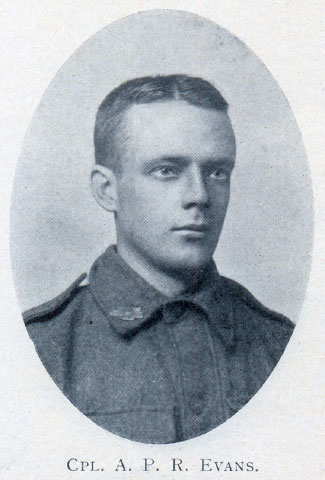
Allan Evans was born on 17 May 1888 in Hotham East, Victoria. His parents were Evan and Alice (née Allen) Evans. He attended Scotch from 1902 to 1904. He won a Government Scholarship in 1901.
Allan was a clerk when he enlisted on 3 October 1916 in Melbourne, Victoria. He served in the 6th Battalion with the rank of Private. His Regimental Number was 6702.
Allan died on 10 August 1918 near Lihons, France. He was 30 years of age.
Service record
Allan seems initially to have been sent to a Signal School, and was soon allotted to the 22nd Reinforcements of the 6th Battalion. He left Melbourne with them on 25 October 1916, arriving at Plymouth on 28 December. He was made an Acting Corporal (E.D.P. Corporal) with the 2nd Training Battalion in England on 9 February. More than five months later, on 29 May 1917, he left Southampton for France.
On arrival at Le Havre he was, in accordance with standard practice, reverted to Private. On 28 June 1917 he was taken on strength of the 6th Battalion. Some three months later, on 19 September 1917, Allan received a gunshot wound to the head and was transferred to a Casualty Clearing Station and then a hospital at Boulogne. He returned to his battalion on 14 October 1917. Some time during this period in later 1917 he wrote to his mother that ‘Our performance in the recent fighting…would read like fairie tales and to get the spirit of heroism of many of our chaps into a letter would be impossible. We lost good officers and good men, but won all the hop overs we were in. The most interesting prizes were the pill boxes of which we had heard so much…As soon as one slope was taken another slope would appear in front, just as heavily defended as the first…During the day Fritz shelled us out of our humpies – we took shelter in the pill boxes.’
On one occasion in November 1917 he was reportedly in a post that was blown in by an enemy shell that killed all the occupants but him. In February 1918 he received two weeks’ leave to the United Kingdom. On 6 June 1918 he was wounded again, this time with a gunshot wound to fingers of the right hand. He was hospitalised.
At some time in 1918 he wrote home about trench raiding: ‘Exciting things these raids, must be careful. A raid consists of sneaking out by dark and snatching a few Fritzes from their home. Did I say home? We sneaked out across No Man’s Land. Horribly dark it was too, and waited. Waited for the moon to rise – crawled through the wire like boys sneaking fruit, remember [presumably a reference to his own boyhood escapades] – and then each man to his allotted task. Some to guard flanks and the rest to make the dash. A barrage opens – ours. No movement of Fritz to show he has spotted us. A barrage pouring shells on both sides of the trench we raid and then Fritz opens with shells. Very lights [flares] and gas…He shot wildly not knowing where we were. In went the raiders pell mell in the moonlight for their prey. Bombs, pistol shots and then we had them. Plenty went most suddenly. We had a few wounded. Took the necessary prisoners – one must take prisoners – very necessary for identification. A wild grab for souvenirs, watches and things. A cloud covers the moon and the time has come for us to decamp. We do it suddenly, at the toot as they say and beat if for the timber. Carefully of course. There are Fritz’s illuminations to think of. He shoots flares and looks for us…Back through the wire and take your time. ’ Not until 2 August 1918, nearly two months after being wounded, did he return to the 6th Battalion. He had barely a week to live.
He was killed in action on 10 August, though some sources suggest it was 9 August. His service record contains a statement by the acting commander of the 6th Battalion that ‘while his platoon were advancing to reinforce 8th Battalion this soldier was struck in the neck by a bullet, which inflicted a mortal wound.’ Corporal James Brownbill wrote of being beside Allan when, just on reaching their objective near Rosieres, Allan was struck and killed instantly by a machine gun bullet to the side of the head (see below). Lance Corporal Wilfred Whiffin saw Allan lying dead the following day. Although he knew Allan well, by his own testimony he just looked at his body and moved on (See below). The Red Cross Wounded and Missing file that includes these testimonies also contains a poignant letter from Allan’s mother, who was eager to learn how her ‘dear boy’ died. It was, she said, ‘so simple to write but so hard to be resigned.’ (see below).
Allan Evans has no known grave, but is commemorated on the Australian National Memorial at Villers-Bretonneux, France.
Photographs and Documents:
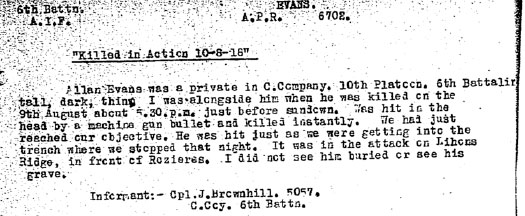
Corporal Brownhill’s account of Allan’s death.
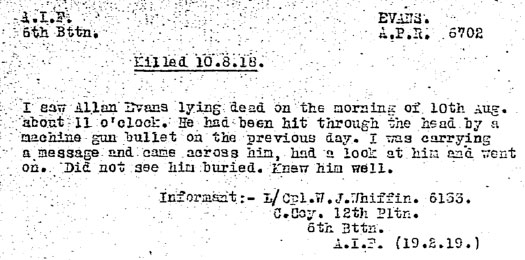
Lance Corporal Whiffin’s account.
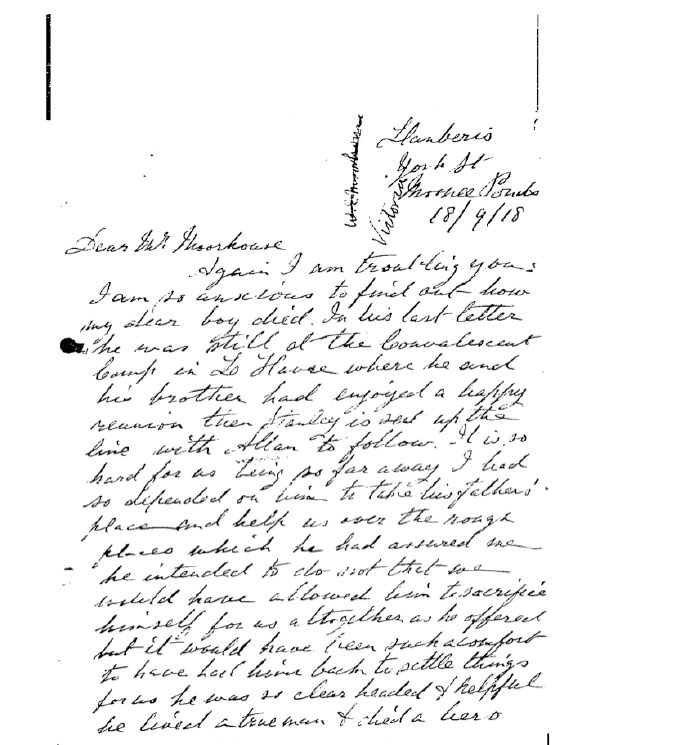
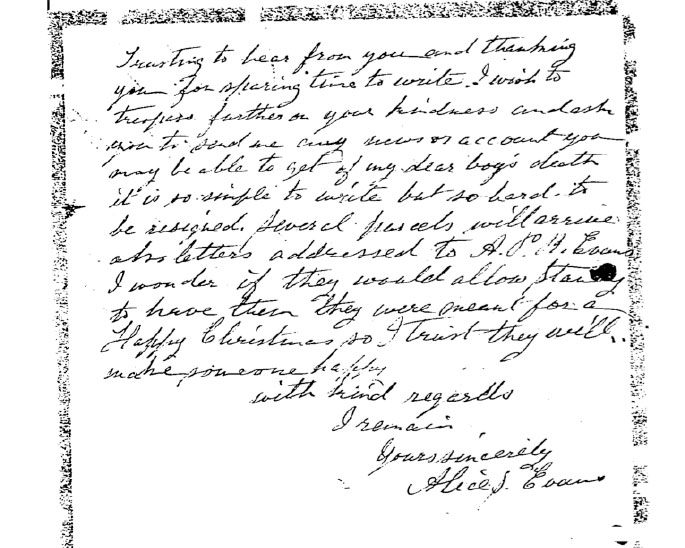
Letter from Allan’s mother to the Red Cross Wounded and Missing bureau asking about his death
Sources:
- Austin, Ron, As Rough as Bags: The history of the 6th Battalion, 1st AIF, 1914-1919, Slouch Hat Publications, McCrae, Vic, 2005.
- Australian War Memorial – Roll of Honour
- Mishura Scotch Database
- National Archives of Australia – B2455, EVANS A P R
- Scotch Collegian 1918
- The AIF Project - https://www.aif.adfa.edu.au/showPerson?pid=92486


